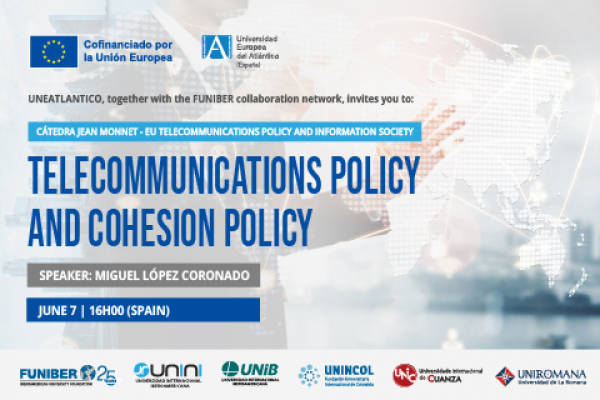
On June 7th at 4 PM (CET), the Universidad Internacional Iberoamericana (International Iberoamerican University) (UNIB) will organize the webinar “Telecommunications Policy and Cohesion Policy”
The session will be run by Miguel López Coronado and is part of the Jean Monnet Programme "Telecommunications Policy in the EU and the Information Society" held by the university.
Cohesion policy has been the main framework for solving the lack of infrastructure problem in Europe's least developed countries, mostly located in the southern and eastern periphery. Telecommunications through their Paneuropean infrastructures are making a decisive contribution to enhancing growth and development synergies by expanding the deployment of broadband and high-speed networks.
The event is held in collaboration with the Universidad Europea del Atlántico (European University of the Atlantic) (UNEATLANTICO), the Universidad Internacional Iberoamericana de México (International Iberoamerican University) (UNINI MX), the Universidade Internacional do Cuanza (International University of Cuanza) (UNIC), the Fundación Universitaria Internacional de Colombia (International University Foundation of Colombia) (UNINCOL), and the Universidad de La Romana (University of La Romana) (UNIROMANA).
The conference is free and open to all those interested in the subject and will be broadcast live in each country via YouTube. You can check the broadcasting schedules in this link. Registration is required in order to participate:
Registration to the webinar “Telecommunications Policy and Cohesion Policy”
If you are interested in receiving the complete training of the session, you can find more information in this link. Students in the program must complete practice sessions focused on gamification and mobile application design to receive their accreditation.
The objectives of the Jean Monnet Programme, which are specialized teaching positions in the European Union studies for university professors and associate professors, are to improve the teaching of EU studies through specialized programs; to conduct, monitor, and supervise research on EU-related topics at all levels of education; to train and advise the next generation of teachers and researchers; and to provide qualified guidance to future professionals in European affairs.

“Financed by the European Union. However, the opinions expressed are the sole responsibility of the author(s) and do not necessarily reflect the views of the European Union or the European Education and Culture Executive Agency (EACEA). Neither the European Union nor the granting authority can be held responsible for them.”